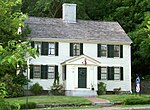WBNW (AM)
1989 establishments in MassachusettsBusiness mass media in the United StatesBusiness talk radio stationsConcord, MassachusettsMass media in Middlesex County, Massachusetts ... and 4 more
Massachusetts radio station stubsNews and talk radio stations in the United StatesRadio stations established in 1989Radio stations in Massachusetts
WBNW (1120 AM) is a business talk radio station in the Boston market. The station is owned by Money Matters Radio, Inc. and is licensed to Concord, Massachusetts. It is simulcast on translator station W275CM (102.9 FM) in Concord. WBNW's flagship program, The Financial Exchange, is syndicated to several other stations in New England through the Money Matters Radio Network. Among the talk hosts have been Michael Graham, Don Imus, and John Batchelor were added to the lineup.
Excerpt from the Wikipedia article WBNW (AM) (License: CC BY-SA 3.0, Authors).WBNW (AM)
Knox Trail,
Geographical coordinates (GPS) Address Nearby Places Show on map
Geographical coordinates (GPS)
| Latitude | Longitude |
|---|---|
| N 42.448333333333 ° | E -71.4275 ° |
Address
WADN-AM (Concord)
Knox Trail
07120
Massachusetts, United States
Open on Google Maps











